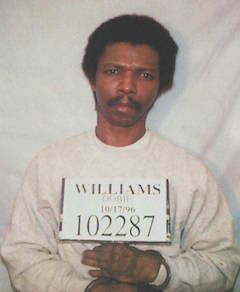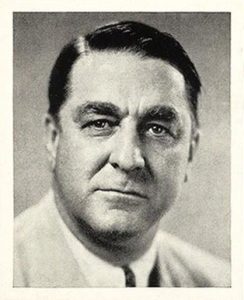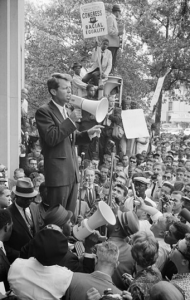Throughout the history of the United States, there have been tens of thousands of murders, rapes, and other heinous crimes. For over two-hundred years, the United States government intended to establish a fair and judicial system of justice. However, as countless cases of accused criminals have shown, our judicial system is not all that equal. As cases from the past prove, there have been instances where errors in the judicial system occur, resulting in unfair trials. Even worse, some of those inmates who have had unfair trials were convicted and in some cases, even sentenced to death row. So, is our judicial system all that just for all? In many cases it is just; however, in too many cases throughout our history, the system has been unfair to a number of accused individuals. An example of this is the trial of Dobie Williams, a young black man accused of the murder of a middle-aged white woman, Sonja Knippers on July 8, 1984. Dobie Williams had an unfair trial due to his race, few accommodations for his mental health, and an inept court-appointed attorney that he was provided.

Geography and race had a role to play in the unfair trial of Dobie Williams. Knippers was a white woman in her early forties, who was brutally killed in the bathroom of her southern home, located in Many, a small town in Lousiana, which was not a good place for Dobie, an African American, to be accused of murdering a white woman. Sister Hellen Prejean, a writer and a spirtual adviser for death row inmates, who accompanied Dobie throughout his trials and execution dates, explains that Dobie never had a fair trial due to being assigned an all-white jury during his hearing for the murder of Knippers; in addition, all of the judges, district attorneys, and the local media during the time were all white, further explaining possible prejudices that could stacked the odds against him. Many is a small town located in north central Louisiana, and it was not a city. It was a small, quiet, and mostly white town, where murder, or basically any other crime, was erratically unusual, especially in 1984, meaning that when crimes did happen, it was a huge deal. Consequentially, being a black individual accused of murdering a middle-aged white woman in a small town in the south was a bad situation to be in. We will never know for sure whether an all-white jury had anything to do with the conviction of Dobie Williams. But it still was not looking good for him, due to where the murder had taken place and the significance of the crime. In her book, Prejean, realizing the social injustices in Louisiana during the 1980’s, exclaimed that Dobie was, “in big trouble.”1 Prejean understood how geography had a role to play in the conviction of Dobie. Innocent or guilty, being a black minority during the time of Dobie’s trial in a small town located in the heart of the south was no easy thing to endure.

There are similar cases to Dobie’s in which a fair trial was not given because of such geography. In 1982 in Greenwood South Carolina, race played a significant role in the conviction of twenty-three-year-old Edward Lee Elmore, who was accused of the rape and murder of seventy-five-year-old Dorothy Edwards. According to Bishop Emmanuel Spearman, who was pastor to Edward, race played a major role in the trial.2 Spearman made a plausible statement about the trial because Edward, the African American, was accused of the murder of an elderly white woman in 1982, which was a severe offense. This could have given him an unfair trial due to the murder taking place in a small town in Greenwood, South Carolina, where just like Many, murder was rare. Something as significant as both murder and rape of an elderly white woman in a small, southern town would be considered heinous.
Dobie Williams did not have well-suited accommodations. In the 1980’s, individuals such as Dobie who had an IQ below 70, did not yet have the defense based on the Supreme Court case, Atkins v. Virginia, which ruled that capital punishment is unconstitutional for defendants with mental retardation.3 This meant that below average IQ could not be used in defense of Dobie Williams until the Supreme Court case was actually ruled. This can be related to Edward Lee Elmore, who had an IQ below 70, which made it difficult for him to understand the questions that were being asked while defending himself in a courtroom, when he was asked questions by district attorney, William T. Jones, who said, “You want this courtroom to believe you’re this quiet don’t you?”4 Edward lacked the competence to understand how to effectively defend himself while being asked harsh questions, due to being mentally handicapped. Furthermore, according to Celia B. Fisher, studies have demonstrated that “contribution to legal decisions concerning competency and predictions of future violence places the defendant at the mercy of an imperfect and unjust system.”5 The study shows that a defendant’s mental status is critical in the fate of that individual who is being accused of a heinous crime. Dobie Williams was a mentally-handicapped individual on trial for a severe act, and who was unable to properly defend himself, thus resulting in him to be at the mercy of a flawed judicial system.

Dobie Williams grew up in an impoverished childhood, giving him no other choice but to be assigned Michael Bonnette, his overworked public defender for his case, who had limited experience in death penalty cases, giving him an unfair trial. Sister Helen Prejean exclaims, “They know the difference in treatment given the O.J’s of the world in contrast with the NoJ.’s, forced to accept overworked, underfunded, or inept attorneys to defend them.” The fact of an incompetent, overworked, and underpaid attorney being assigned to Dobie, resulted in him making mistakes that affected the whole trial. During his trial, Dobie’s overworked public defender failed to successfully acquire any independent forensic testing, resulting in him being unable to provide a proper counter to the prosecutor’s claim against him. This mistake allowed for the argument against Dobie to be uncontested for thirteen years. Furthermore, it was Dobie’s financial situation that not only affected his opportunity to be assigned a more effective private attorney, but it also prevented him from having certain tests performed that could have aided him during his trial.6
There are other cases that explain the error of our judicial system. The trial of Dobie Williams is just one case out of too many that has been unfair. According to Sister Helen Prejean, there have been numerous cases of inaccuracy by the state and federal courts, thus compelling them to free 117 innocent death row inmates since 1973.7 Prejean presents the dramatic statistic in her book, The Death of Innocents, which was published in 2004. Imagine what the number has been now since the book was published. In addition, in 2000, Illinois’s governor, George Ryan, proclaimed a moratorium for the death penalty of the state, confirming that 13 death row inmates have been exonerated in the past 23 years.8 The appalling statistics illustrate the probable flaw in the judicial system of the United States, making it more likely to believe that Dobie Williams had an unfair trial.
Minorities in southern areas who are accused and convicted of a crime are more highly exposed to unfair trials compared to other individuals. Even though the right to a public attorney is granted with the intention of an equal judicial system, in reality, that is just not the case. Dobie Williams could not afford a private attorney who had experience with the death penalty, resulting in him being unable to receive the proper defense that he deserved due to the inept, overworked, and underpaid public defender that he received. Dobie was unable to defend himself due to his below 70 IQ. With all of the facts in place, was the judicial system in the case of Dobie Williams all that just when there have been numerous accounts of accused inmates being exonerated due to a flaw in the system?
- Sister Helen Prejean, The Death of Innocents (New York: Random House, 2005), 19. ↵
- Life on Death Row, “Death Row Stories-Edward Lee Elmore,” 1:47-3:33, March 27, 2017, https://www.youtube.com/watch?v=aSCJkTPft5g&t=2s. ↵
- Celia Fisher, “Human Rights and Psychologists’ Involvement in Assessments Related to Death Penalty Cases,” Ethics and Behavior 23 no.1 (2013): 58. ↵
- Life on Death Row, “Death Row Stories-Edward Lee Elmore,”16:22 , March 27, 2017, https://www.youtube.com/watch?v=aSCJkTPft5g&t=2s. ↵
- Celia Fisher, “Human Rights and Psychologists’ Involvement in Assessments Related to Death Penalty Cases,” Ethics and Behavior 23 no.1 (2013): 60. ↵
- Sister Helen Prejean, The Death of Innocents (New York: Random House, 2005), 13-17. ↵
- Sister Helen Prejean, The Death of Innocents (New York: Random House, 2005), 17. ↵
- Robert Sigel, “Profile: Illinois Governor George Ryan has placed a moratorium on death penalty executions, citing the state’s shameful record of putting innocent people on death row,” NPR, January 31, 2000. ↵



74 comments
Wesley
I’m Dobie William family relative & this still hurt me til this very day.
Vianka Medina
It frustrates me how he case was handled. The fact that his race had played a major role in his case, because of course then, racism was more problematic to everything. It still plays a major role in today’s society and justice system, but on top of that, Dobie was mentally handicapped! It is also very unfortunate that his lawyer did not help much in this case since Dobie did not have enough money to pay a high quality lawyer. It is sad that this still happens to today, where people are wrongfully convicted and take someones word instead of trying to figure the actual facts.
Edith Santos Sevilla
The article is eye opening for the flaws of the justice system, it can be seen that Dobie Williams did not have a fair trial, for several reasons, and as mentioned in the article besides not given the resources for him being considered handicap, it can also be said that it was a discrimination against him from the jury. When I was reading the article I did not want to believe that those type of things actually happened here, and that it is not the only case where the justice system made a mistake. There are a ton of other cases where people were wrongfully accused or were not given the proper resources for their needs.
Shea Slusser
This article was a very good read and gave readers the realization of how bad our unjust judicial system really is. The fact that Dobie was considered mentally handicapped and yet he still did not get the proper trail he deserved, is very disheartening and is one of many examples of innocent individuals are being proved guilty. I glad that racism is slowly getting better as we progress into the future, but we ca only wish that it will go away forever.
Briana Montes
The article was very well written and informative. Before reading this I did not know about Dobie Williams but I see that the justice system is unjust and they put people to death penalty even when they may be innocent. Overall this Article was very well structured and helped me see that the system is messed up in many ways.
Michael mallard
I’m from the small town and still today the same thing is going on … My the truth be told the husband of the victim killed her because she was sleeping with Dobie Williams… Many ,la is a white ran town and they stick TOGETHER…. when will they be stopped
Cristianna Tovar
This article does an amazing job at shedding light on the corrupt and unjust acts the judicial system of the United States has performed. I like how this article describes the background of Dobie Williams and explains thoroughly how he was treated unfairly in the judicial system. Although the conviction of Dobie Williams occurred in 1894, there are many instances in which individuals are unfairly convicted of a crime still occurring today, which is heartbreaking, to say the least. If there was one thing I could add to this article, it would be more information about how Williams was accused and who accused him. Overall, this article was very informational and although it’s heartbreaking, this sad reality needs to be talked about more.
Mitchell Yocham
There has been tons of situations in the past, mostly dealing with African Americans, that are wrongfully accused and the actual perpetrator gets away because the accused couldn’t defend themselves. To me I think that is so horrible because in the past, Americans used African Americans as their scapegoats, when in reality everyone should get an equal chance at living their best life. It really is sad and embarrassing that this used to and still probably happens, but I think more people should be aware of this.
Priscilla Poorbaugh
As much as we would like to think the judical system in the US is just, there’s so many occasions, like the Dobie Williams case, that shows how unjust our system can be. Being a black man in the south where a murder occurred, of course the town would instantly point the finger at him. It’s crazy to me that the people who are supposed to be unbiased and just are the ones that use race to determine their verdict, especially when the death penalty was on the line.
Diamond Davidson
This article was really good. I like how it was structured and it was well-written. It’s sad to believe that things like this happens to innocent people. I don’t understand why they would still charge him with murder if he had a low IQ below 70, of course it was because he was black surrounded by a lot of white people during his trail. However not only black people but other races of color are also getting charged for many things when they are innocent. The US justice system is really messed up in so many ways!